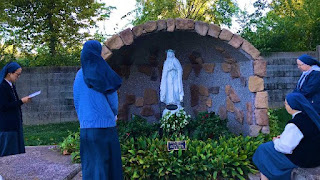USE YOUR POSSESSION AND POSITION TO GAIN ETERNITY
Homily for the Twenty-fifty Sunday in Ordinary Time, Year C
Fr. Ugochukwu Ugwoke, ISch
Scriptural Texts: Amos 8:4-7, 1 Timothy 2:1-8, Luke
16:1-13
The
parable of the shrewd or crafty steward which we read in our today’s gospel reading
is one of the most difficult lessons of Jesus to unpack (Luke 16:1-13). The parable
is fraught with difficulties, for many read it as if Jesus is extolling
dishonesty. But it is not so. Jesus is not putting him forward as an example to
be followed, but rather as a lesson from which we may have something to learn. The
steward is dishonest in his management and stewardship of his master’s possessions
(Luke 16:1-2). But despite his dishonest and wasteful attitudes, Jesus uses the
parable to teach us lessons on the prudent and wise use of material wealth and
possessions. Apparently, God communicates with us through all of life’s
situations, including those situations that are not particularly noble or
exemplary.
The
first lesson we learn from that parable is that like the steward, we too are
stewards of God’s gifts, and one day, we will be summoned to give account of
our stewardship. Stewardship is not ownership. A steward is a person who is
given responsibility to handle the goods and property of his/her employer. We
must remember that we are stewards of what God has provided for us, not owners.
We have no absolute right to anything we have. As such, we have to ask ourselves:
how well are we using the resources the Lord has provided us with for his
service and the service of others? Are
we using them to make the kind of friends Jesus refers to in the Gospel as friends
who will welcome us ‘into the tents of eternity’ (Luke 16:9)?
As
stewards, one important quality which we must possess is trustworthiness/faithfulness.
We must prove to be faithful and trustworthy. As Jesus says, if you are
faithful in little things, you will be faithful in large ones. But if you are
dishonest in little things, you will not be honest with greater
responsibilities. And if you are untrustworthy about worldly wealth, who will
trust you with the true riches of heaven, and if you are not faithful with
other people’s things, why should you be trusted with things of your own? ((Luke
16:10-13).
As
stewards in charge of God’s gifts, the parable teaches us that the best way to
take care of the things that God has given us is to use them to serve the poor
and needy. We are to treat our earthly riches as resources given to us in trust
by God for the well-being of others. This is also the point that the prophet
Amos stresses in the first reading when he speaks against those who make money
by undermining the well-being of the needy and vulnerable. He says that unfair
business practices and injustice to the poor will be judged by God. (Amos 8:4-7).
Following the example of the shrewd steward, Jesus calls on us to use money to
win the kind of friends who will welcome us into the tents of eternity when our
possessions are gone (Luke 16:9). The steward uses his master’s money to gain
earthly friends. We are to use our worldly possessions to gain heavenly
friends- to build treasures in heaven. Certainly, by this, Jesus is not saying
that we can buy our way into heaven.
Lastly,
Jesus warns us that no one can serve two masters at the same time. We cannot
serve both God and material possessions (Luke 16:13). Service of God is
incompatible with service of wealth. Material things are used and God is worshipped.
But in our time, the reverse is the case. We must therefore learn to use our possessions
to serve and worship God. And in our service of God and his reign of love and
justice, we must be as decisive as the steward was. But instead of acting
dishonestly, like him, we must take those actions that serve God’s purposes and
that lead to a more human and just world and thus win us eternal life.



Thank you Fr
ReplyDelete